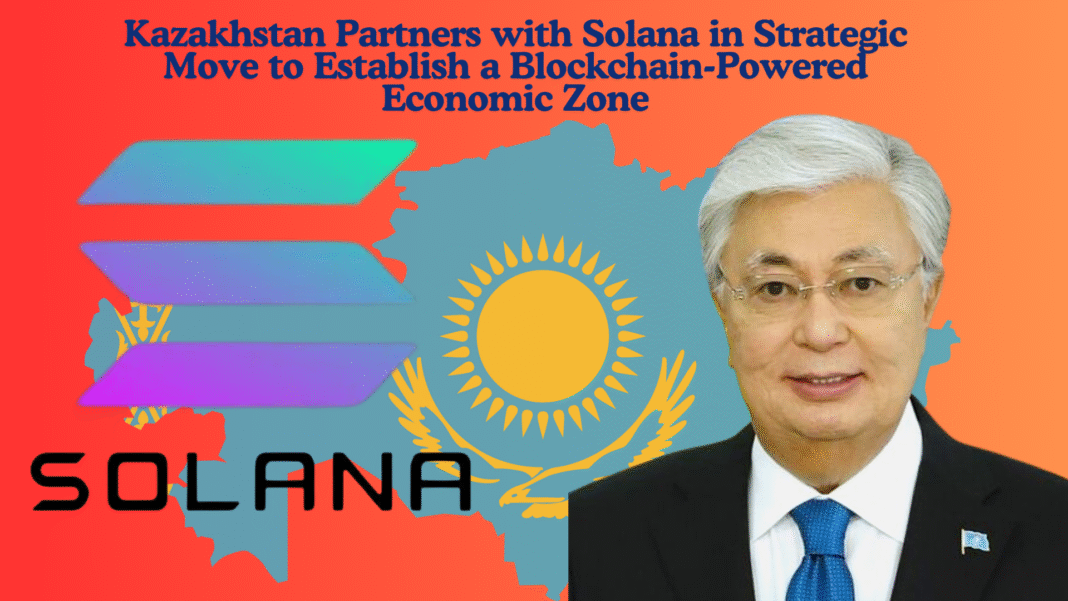In a landmark move for Central Asia, the Government of Kazakhstan has signed a Memorandum of Understanding (MOU) with the Solana Foundation.
The partnership marked the first formal collaboration between a nation in the region and the globally renowned blockchain platform.
This partnership is part of Kazakhstan’s strategic vision to position itself as a regional leader in digital innovation and blockchain integration.
The initiative will create a blockchain-powered “Solana Economic Zone,” intended to attract developers, businesses, and investment focused on Web3 and decentralized technologies.
Solana Economic Zone Aims to Mirror Global Success Models
The creation of the Solana Economic Zone is modeled after successful international examples, including Dubai’s Multi Commodities Centre (DMCC) Crypto Centre, which has become a hub for blockchain companies in the Middle East.
Kazakhstan aims to replicate this model by offering a dedicated environment for the growth of blockchain ecosystems.
By partnering with Solana, one of the most active and scalable blockchain networks. Kazakhstan hopes to accelerate the adoption of decentralized finance (DeFi), tokenized assets, and other Web3 applications within its economy.
The partnership is seen as a strategic effort to transform Kazakhstan into a blockchain-friendly jurisdiction with robust technological infrastructure and supportive policies.
Also Read: Kazakhstan To Launch “CryptoCity” Pilot Zone, Aiming To Make Crypto Payments Familiar
Government Officials Emphasize National Digital Growth Strategy
Zhaslan Madiyev, Kazakhstan’s Minister of Digital Development, Innovation, and Aerospace Industry, emphasized the government’s commitment to fostering a competitive and forward-looking digital environment.
He noted that the Solana Economic Zone would allow Kazakhstan to test and implement cutting-edge technologies, such as asset tokenization and smart contract solutions, while also nurturing local talent.
Madiyev stressed the broader implications for the crypto ecosystem, asserting that innovation hubs like this one are essential to building a resilient, future-ready economy.
Key Pillars: Tokenized Markets, Developer Education, and Business Support
The Solana Economic Zone will focus on three foundational pillars: tokenized capital markets, developer education, and business infrastructure.
On the financial front, the Solana Foundation will work with AIX (Astana International Exchange), Jupiter, and Intebix to pilot tokenized financial instruments.
They aim to bridge traditional capital markets with blockchain technology.
Additionally, a major educational push will be made to cultivate local Web3 talent, including university-level Rust programming courses supported by Solana. These efforts aim to build a sustainable developer ecosystem capable of innovating within the broader Solana network.
Also Read: Kazakhstan’s Lower House Member Azat Peruashev Proposes National Crypto Bank
Business Incentives and Regulatory Support to Attract Global Blockchain Firms
To encourage blockchain startups and established companies to set up operations in Kazakhstan, the partnership includes the development of infrastructure, regulatory frameworks, and business incentives.
These measures are designed to reduce friction for new businesses entering the country and to create a vibrant, innovation-driven economic zone.
With regulatory clarity, access to blockchain tools, and educational pipelines, Kazakhstan aims to emerge not only as a technological hub in Central Asia.
Also as a global destination for blockchain enterprises, leveraging the Solana partnership as a springboard for long-term digital transformation.
Also Read: Kazakhstan Aims to Expand Legal Crypto Operations, President Calls for Action


